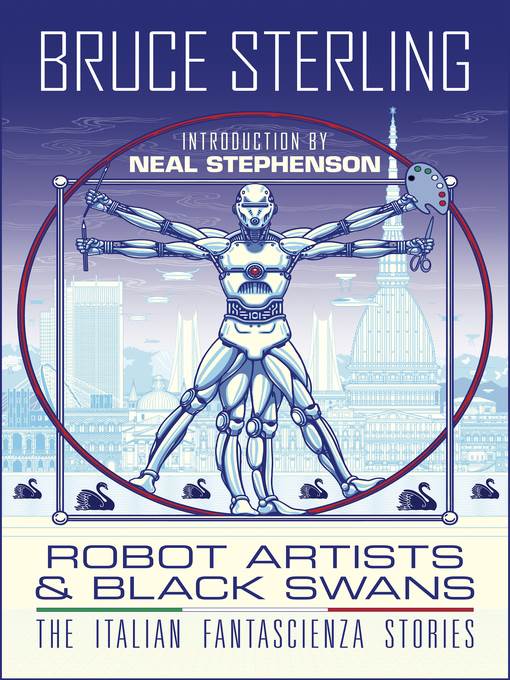
Robot Artists & Black Swans
The Italian Fantascienza Stories
کتاب های مرتبط
- اطلاعات
- نقد و بررسی
- دیدگاه کاربران
نقد و بررسی

January 4, 2021
Set largely in Turin, Italy, this urbane collection of seven stories from futurist Sterling (Pirate Utopia) reflects the author’s wholehearted embrace of both the post-human future and Italian culture. The narrator of the 2061-set “Kill the Moon” is charitably embarrassed by the sentimentality of his countrymen (“Why are we Italians the only people who still believe that space flight is romantic?”) as they giddily celebrate Italy’s belated mission to the moon. For readers unsatisfied with only one future Italy, “Black Swan” offers a tour through a series of alternate versions of the country, imagining a technologically advanced Italy built on the computer work of fantasist Italo Calvino but threatened by the skullduggery of underworld kingpin Nicholas Sarkozy. In “Pilgrims of the Round World,” a couple facing a long journey from 1463 Turin to the court of the Queen of Jerusalem in Cyprus argue over the value of art just as ferociously as a 2187 art dealer and a post-human anthropologist debate the nature of robotic creation in “Robot in Roses.” Sterling’s clever, compassionate work will appeal to fans of intelligent cyberpunk. Agent: Merrilee Heifetz, Writers House.

February 15, 2021
Seven Italian-flavored confections from one of the prime architects of cyberpunk, who lives in Turin. It's been a while since we've heard from Sterling, most recently with the novella Pirate Utopia (2016), a piece of what the Italians call fantascienza, an SF-adjacent combination of history and speculation. Here, he takes it to another level, labeling these seven stories as the work of Bruno Argento, his alter ego, a renowned dramatist who has driven the Italian subgenre into the mainstream. With an introduction by Sterling's spiritual offspring Neal Stephenson and a nod to Primo Levi, arguably the most famous denizen of Sterling's adopted hometown, this collection resurrects some recent works published previously as e-books and introduces a handful of stories in a similar vein. "Kill the Moon" is endearing in its na�ve imagination as it expounds on the embarrassment the narrator feels in 2061 about Italy reaching the moon. "Black Swan," in the manner of Pirate Utopia, hinges on futuristic technology that serves as a MacGuffin but also plays havoc with history, postulating an alternative reality in which a journalist whose world features Nicolas Sarkozy as an underground terrorist suddenly finds himself presented with multifarious realities. "Elephant on Table" is less Matrix than Chaucer as the denizens of a medieval-flavored Shadow House navigate the inevitable politics of imperial power. "Pilgrims of the Round World" continues the royal drama as Sterling delivers a Shakespearean tale set a century or so before the bard took the stage. "The Parthenopean Scalpel," previously published in the collection Gothic High-Tech (2012), is rich but will probably carry more weight with readers familiar with Turin's history. Finally, there's "Esoteric City," explaining how Italian hell is different from regular hell, and "Robot in Roses," an imaginative take on the moral quandaries of Blade Runner, finishes the ride. A delightful mix of high fantasy and futuristic speculation featuring royalty, noblemen, bandits, and other scoundrels.
COPYRIGHT(2021) Kirkus Reviews, ALL RIGHTS RESERVED.

March 1, 2021
Sterling is a visionary, equally at home writing about the future as he is of the past, and his inspired prose continues to provoke and satisfy. For his latest foray in storytelling, Sterling adopts the Italian persona, Bruno Argento, "an unlikely 'cyber-punk' Texan who somehow decides to become Turinese," in order to mine the treasures of his adoptive country in this series of fantastic (or fantascienza) stories. As Argento, Sterling embraces his new identity wholeheartedly, evoking such former denizens of the locale as Italo Calvino, Primo Levi (who wrote sf under the moniker Damiano Malabaila), even Friedrich Nietzsche (who resided there while madness overtook him). In the titular "Black Swan," a tech blogger follows a suave industrial spy across multiple Turins, each one on a different trajectory--watch for cameos from Nicolas Sarkozy and Carla Bruni. The robot artist of the title appears in "Robot in Roses," in which an art critic accompanies (and attempts to explain) The Winkler, a robot in the form of a wheelchair, as it navigates the ruins of a radioactive future Rome. Sharp, witty, erudite dialogue keeps the stories moving along.
COPYRIGHT(2021) Booklist, ALL RIGHTS RESERVED.

























دیدگاه کاربران